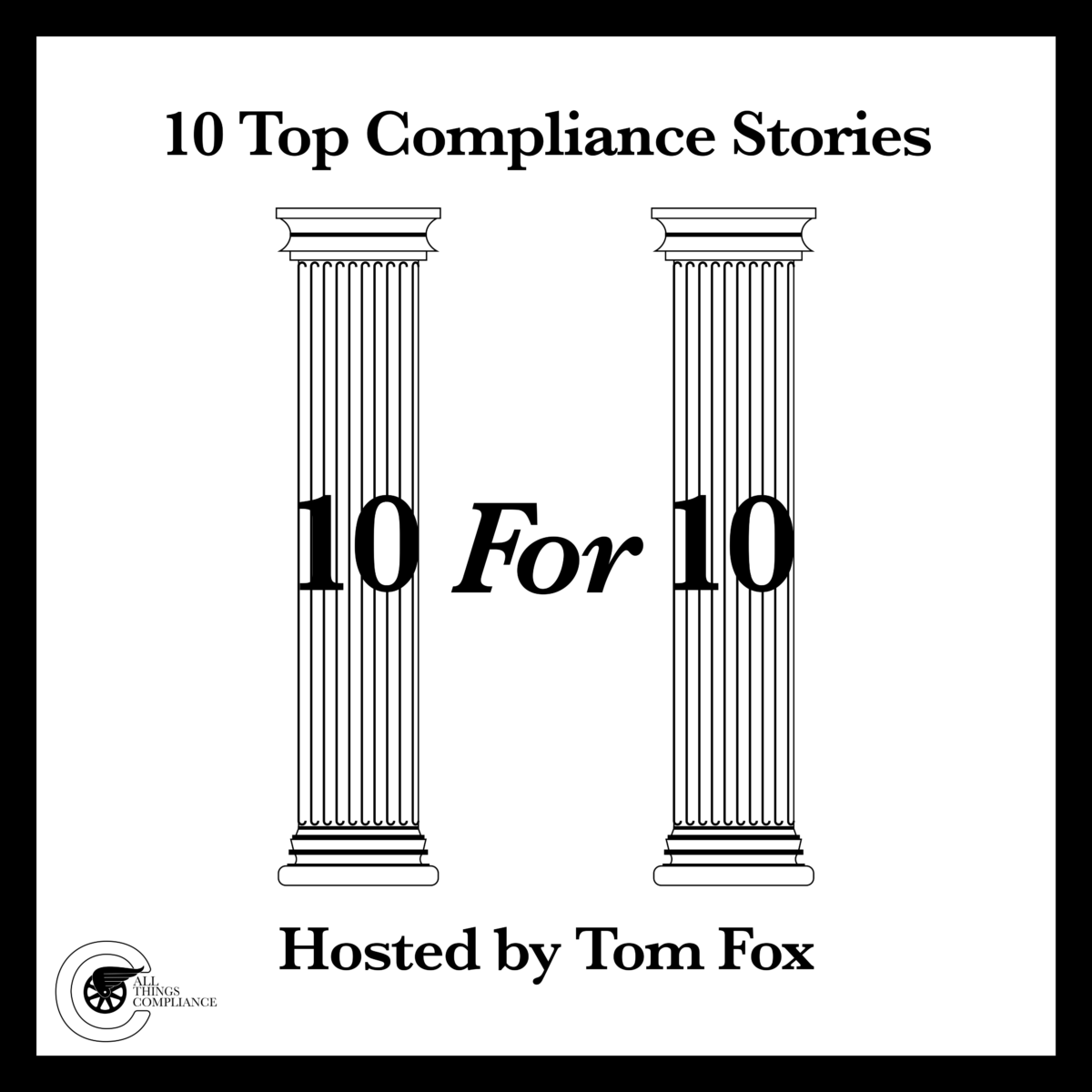The role of the compliance professional and the compliance function in a corporation has steadily grown in stature and prestige over the years. When it came to the corporate compliance function, 2020 FCPA Resource Guide, 2nd edition, under the Hallmarks of an Effective Compliance Program, simply noted the government would “consider whether the company devoted adequate staffing and resources to the compliance program given the size, structure, and risk profile of the business.”
This Hallmark was significantly expanded in both the original FCPA Corporate Enforcement Policy and 2023 ECCP. In the FCPA Corporate Enforcement Policy, the DOJ listed the following as factors relating to a corporate compliance function, that it would consider as indicia of an effective compliance and ethics program: 1) the resources the company has dedicated to compliance; 2) the quality and experience of the personnel involved in compliance, such that they can understand and identify the transactions and activities that pose a potential risk; 3) the authority and independence of the compliance function and the availability of compliance expertise to the board; 4) the compensation and promotion of the personnel involved in compliance, in view of their role, responsibilities, performance, and other appropriate factors; and 5) the reporting structure of any compliance personnel employed or contracted by the company.
Clearly the DOJ is articulating that in an operationalized compliance program, it expects true compliance professionals, who understand the way compliance interacts with and supports the business. Companies must compensate and promote compliance professionals within their organization.
Funding and resources. You will now have to justify your corporate compliance spend. This means at a minimum you will have to meet some general industry standard. If a corporation tries to low-ball both the pay to compliance professionals, as well as the dollar and head count made available to a compliance function, it will not be viewed positively. Also noted in the Evaluation, a company must be prepared to defend any request for compliance resources which are turned down. Budget requests and allocations are always difficult times in any corporation. There is never enough money to go around and most senior management thinks it is their job to slash all budget requests as a simple matter of course. Now such blanket management will be penalized.
If a compliance function is so hampered by resource restrictions it cannot carry out the basic functions needed for a compliance program to operate, it will not find favor under either the Evaluation or the FCPA Corporate Enforcement Policy. If there are compliance projects needed to address basic compliance risks which are not funded because management failed to heed a CCOs or compliance functions budget request, this could be evidence of conscious indifference by senior management.
Role of compliance and empowerment. More than simply throwing money at the compliance function (as if that would ever happen) the DOJ is now inquiring into how the compliance function and its recommendations are treated. If there is business unit over-ride of compliance decisions, there must be an auditable decision trail. This, of course, is anathema to corporate executives who do not want to put themselves at risk.
But more than simply preventing management over-ride, a corporate compliance function has to be empowered by the Board and CEO to intervene in business decisions that implicate the company’s ethics and compliance issues, compliance with business code of ethics, agent/distributor and supplier codes of conduct, training, communication and internal investigations. If a company considers a business decision or practice that implicates the company’s ethical principles, the compliance function must have the internal authority to weigh in and ensure that ethical principles and compliance issues are factored into the business decision.
In the 2023 ECCP, under Section III, Does Your Compliance Program Work in Practice, is the following new language “Independence and Empowerment – Is compensation for employees who are responsible for investigating and adjudicating misconduct structured in a way that ensures the compliance team is empowered to enforce the policies and ethical values of the company? Who determines the compensation, including bonuses, as well as discipline and promotion of compliance personnel or others within the organization that have a role in the disciplinary process generally?”
This is a significant new addition to the ECCP. It forces a company to adequately compensation those employees who investigate and pass judgment on misconduct. But it is more than simply adequate compensation as it also requires a company not to retaliate via low salaries or limited raises or other compensation for doing their jobs as compliance officers. In other words, if the CEO is being investigated by compliance; that same CEO should not be setting or reviewing the salary of the CCO or those doing the investigation. This mandates that the DOJ will review the entire corporate organization on these issues.
Outsourcing of compliance. This area of compliance practice has arisen largely since the articulation of the Hallmarks in the 2020 FCPA Resource Guide, 2nd edition. While this might make sense from a cost perspective, it can be largely problematic if it is not managed properly. Rarely do outsiders have the same access as corporate employees, particularly in a function as important as compliance. Additionally, there will never be the trust level with outsiders there is with someone who wears the same color shirt as the employees. Here a company must not only have a rationale in place, which will largely be cost savings; a company must also have a mechanism in place to assess, on an ongoing basis, any outsourced compliance function. This will be beyond the reach of probably 99% of the companies engaged in such outsourcing.
The 2023 ECCP had further detailed questions to pose:
Structure—Where within the company is the compliance function housed (e.g., within the legal department, under a business function, or as an independent function reporting to the CEO and/or board)? To whom does the compliance function report? Is the compliance function run by a designated chief compliance officer, or another executive within the company, and does that person have other roles within the company? Are compliance personnel dedicated to compliance responsibilities, or do they have other, non-compliance responsibilities within the company? Why has the company chosen the compliance structure it has in place? What are the reasons for the structural choices the company has made?
Seniority and Stature—How does the compliance function compare with other strategic functions in the company in terms of stature, compensation levels, rank/title, reporting line, resources, and access to key decision-makers? What has been the turnover rate for compliance and relevant control function personnel? What role has compliance played in the company’s strategic and operational decisions? How has the company responded to specific instances where compliance raised concerns? Have there been transactions or deals that were stopped, modified, or further scrutinized as a result of compliance concerns?
Experience and Qualifications—Do compliance and control personnel have the appropriate experience and qualifications for their roles and responsibilities? Has the level of experience and qualifications in these roles changed over time? How does the company invest in further training and development of the compliance and other control personnel? Who reviews the performance of the compliance function and what is the review process?
Funding and Resources—Has there been sufficient staffing for compliance personnel to effectively audit, document, analyze, and act on the results of the compliance efforts? Has the company allocated sufficient funds for the same? Have there been times when requests for resources by compliance and control functions have been denied, and if so, on what grounds?
Data Resources and Access—Do compliance and control personnel have sufficient direct or indirect access to relevant sources of data to allow for timely and effective monitoring and/or testing of policies, controls, and transactions? Do any impediments exist that limit access to relevant sources of data and, if so, what is the company doing to address the impediments?
Autonomy—Do the compliance and relevant control functions have direct reporting lines to anyone on the board of directors and/or audit committee? How often do they meet with directors? Are members of the senior management present for these meetings? How does the company ensure the independence of the compliance and control personnel?
The 2023 ECCP and 2023 Update to the FCPA Corporate Enforcement Policy both demonstrate the continued evolution in the thinking of the DOJ around the corporate compliance function. Their articulated inquiries can only strengthen a corporate compliance function specifically; and the compliance profession more generally. The more the DOJ talks about the independence of the compliance function, coupled with resources being made available and authority concomitant with the corporate compliance function, the more corporations will see it is directly in their interest to provide the resources, authority and gravitas to compliance position in their organizations.








